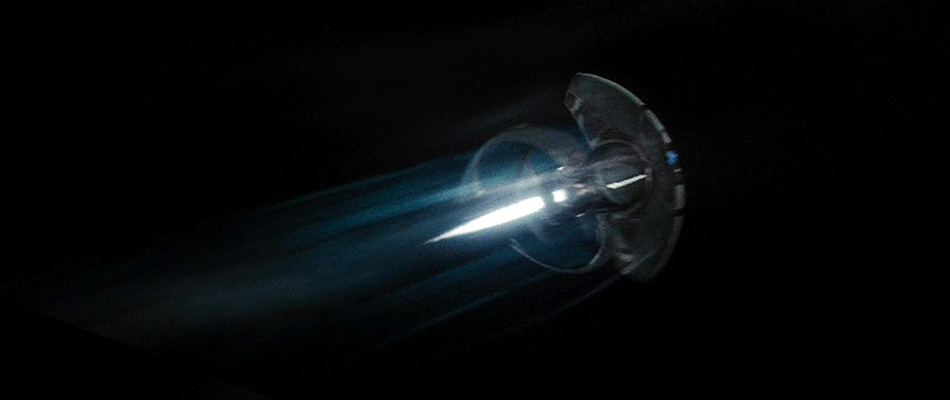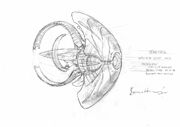The Jellyfish is the dominant ship of the early game. It’s faster and stronger than just about any ship in the early game. In the first few months after the game was launched, this was the ship that was terrorizing everyone who didn’t have one.
Using Your Jellyfish
Its Ship Ability is “Pilot Recognition.” This increases the effectiveness of its Captain Maneuver by 15%. So pretty much any crew setup you can imagine will be more effective. This makes it great with a Klaa speed crew, or with a Morale crew, or with the Starfleet Academy crew against hostiles. My biggest use for this ship was in harvesting OP resources and materials, which made it much easier to advance in levels from 18 to about 23.
It’s got two energy weapons that it fires in each round. And it’s quick. One of the ways you win a lot of PvP battles in STFC is by picking your battles. It starts out with an impulse speed of 110, which is fast for an Explorer. With the Klaa crew, I can get it my Jellyfish’s speed up to 175. With the Pan crew, I can get it to 204. This will vary based on synergy, but still, that’s quick.
I’d wake up at between 5 and 6, and just run a quick circuit around lower Federation space, and upper indy space, and get at least 200k in op Tritanium. This doesn’t seem like much now when I can fill my Antares up with nine times that much in one scoop, but at the time, that was enough to upgrade a ship or start new research.
It’s not much of a base cracker, the North Star is far better in that department, but at level 15, if you find a juicy enough base, and you’re willing to foot the repairs, you can break a base with it.
It’s also been coming up a lot lately in the Live Target Practice event.
The Cost of Owning A Jellyfish
To give you some context, we’ll compare the Jellyfish with the other Explorer you can build at level 12 – the Turas. As you can see, the Jellyfish is going to cost you about four times as much Tritanium, and three times as much Dilithium. It’s also about twice as expensive in uncommon and common gas.
But… if you use your Jellyfish as an OP raider, and time it correctly, it should pay for itself in terms of in-game resources fairly quickly.
And of course, when it comes to performance, the Jellyfish blows the Turas away. I’ve maxed out a Jellyfish, and a Turas for comparison. Your numbers will differ for mine due to officers, and research and station upgrade levels – but the principle is the same.
The Jellyfish is much, much stronger, and has a better warp range.
How to Get A Jellyfish
You’ll need 75 Blueprints and a level 12 shipyard to build a Jellyfish. You can get 21 Blueprints from regular missions. Jellyfish blueprints are available in events from time to time. It’s also available for purchase. If you’re serious about advancing in the game quickly, this is a purchase you can justify making. It’s not all super expensive, and you will get a lot of use out of it.

Blueprint Missions

Background
The Jellyfish debuted in Star Trek (2009) as the ship that Ambassador Spock used to try to save Romulus from the Supernova that destroyed that planet and later used by his Kelvin-universe counterpart to defeat Nero and the Narada.
It was launched in 2387 by the Vulcan Science Academy, and according to the comic book “Star Trek: Countdown,” it was designed with the help of Geordi LaForge.
The ship was not given a name in the film, but it was named as the Jellyfish in the script, in which it was described as “a unique-looking spacecraft.” [1] Concept artist Ryan Church envisaged the ship as having a transparent exterior, based on the actual translucent appearance of a jellyfish. Comic book artist Bryan Hitch contributed to the final shape of the ship, taking inspiration from a gyroscope. Church had another idea, of the ship being a cube of pure energy to emphasize its roots in Vulcan science, but J.J. Abrams felt the ship had to have “as much character as Leonard Nimoy had in his face”.
Visual effects supervisor Roger Guyett stated that production designer Scott Chambliss envisaged the ship’s exterior surface as “sophisticated technology married with organic things”. “It might even be a technology Vulcans’ ‘grow’, like a plant of high tensile steel.” Guyett also said the ship’s warp signature was intended to evoke clean “green” energy, in contrast to the “burned dirty fuel” aesthetic of the Narada. (Star Trek – The Art of the Film) The triangular pilot’s chair and circular view screen form the Vulcan IDIC symbol when viewed from behind the main cockpit area. – Memory Alpha

Get Your Jellyfish model from Eaglemoss
Description
This special edition item is not eligible for use with promo codes or discounts.
Subscribers to Star Trek: The Official Starships Collection will receive this special edition as part of their subscription
This special edition from the Star Trek Starships Collection is a XL edition of Spock’s Jellyfish ship from JJ Abrams’s 2009 Star Trek movie. The ship, designed to carry red matter, has an unusual design and looks unlike anything before it. The finished model measures 6.8 inches long by 5.5 inches tall.
Comes with a lavishly illustrated magazine featuring rare production artwork and details about how the ship was designed, starting with legendary comic book artist Bryan Hitch’s first sketch through Ryan Church’s redesigns and culminating with ILM’s final model.

